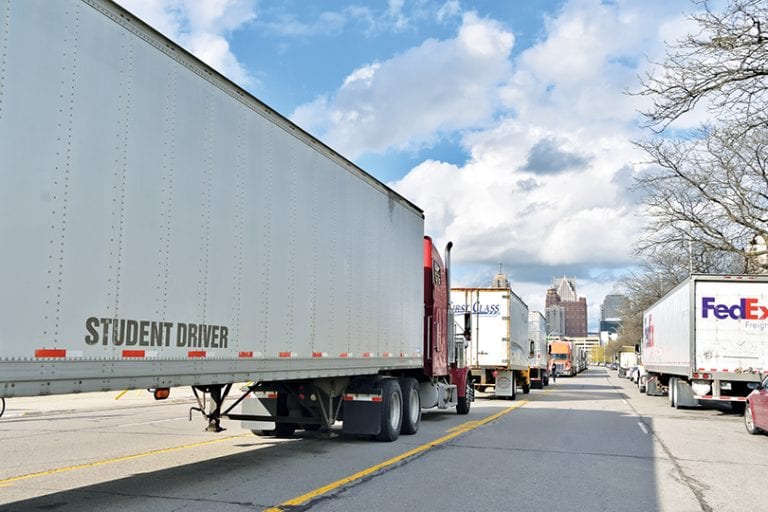A common argument among commercial truck drivers pits drivers who were taught to drive by a relative or friend, or who learned by bouncing around the farm while operating a variety of equipment, against those who graduated from a CDL training school.
Whether it’s a discussion on the CB or comments on social media, every story of a hapless rookie making a mistake seems to be draw a wealth of criticism from drivers who learned “the right way” — either self-taught or from an experienced driver who passed on his or her considerable skills.
The comments often accuse others of being “steering wheel holders” who are, of course, far beneath the professional driver status of the commenter.
Whether self-taught or privately trained drivers received training that was superior to those who attend a CDL school has long been argued, but there are merits to both methods.
Self-taught drivers learn from experience, sometimes driving a variety of equipment on a farm or other operation. Some states allow younger drivers to work in agriculture or other industries.
Privately trained drivers often benefit from their relationship with the trainer. Whether a family member, spouse or friend, the trainer has an emotional bond with the trainee that can promote a greater interest in their performance. Without a specified course length, training can continue as long as necessary to make sure the trainee, in the trainer’s judgment, is ready.
Some CDL schools, on the other hand, can be geared towards passing state testing requirements in the shortest possible time. Stories abound of schools that graduate students in as little as 10 days or two weeks, often teaching just enough to let students pass the tests — while skipping important information about the job.
None of those scenarios are true of all situations, however. There are no qualification standards for private trainers. “Uncle Fred” might represent the epitome of highway professionals, but he could also be a highway menace — albeit an experienced menace — or he could be an excellent truck driver but have horrendous training and teaching skills.
Qualification standards exist for CDL schools, but they are mostly voluntary. CDL training schools that are part of a community or technical college must meet standards set by the college or accrediting organization. Private schools, however, can range from the owner of a dilapidated semi operating in a rented parking lot to programs that rival college-level training in length and content.
Some CDL schools are certified by the Professional Truck Driver Institute (PTDI), which issues standards for curriculum quality and standardization. PTDI schools are closely monitored to ensure compliance with set standards.
Another organization, the Commercial Vehicle Training Association (CVTA), provides an instructor certification program.
Larger carriers that hire graduates of CDL schools almost always provide additional training through a “driver finishing” program. These programs pair recent graduates with experienced driver trainers who help new drivers sharpen the skills learned in CDL school while learning the rest of the truck driver’s job. Training in route planning, company paperwork, dealing with customers and more are added until the new driver is judged to be ready to operate without supervision. Some carriers provide access to driver-mentors or special fleet managers for months after the training.
On Feb. 7, 2022, the argument will officially end for most new drivers. That’s the date the new entry-level driver training (ELDT) requirements mandated by the Federal Motor Carrier Safety Administration (FMCSA) will go into effect.
Included in the MAP-21 highway bill passed in June 2012, the FMCSA ELDT rule became final in December 2016. Under the new regulations, those who want to obtain a Class A or B CDL for the first time, upgrade a Class B CDL to a Class A, or add a passenger, school bus or hazardous materials endorsement to an existing CDL will be required to complete a specified training program.
Although the regulations don’t specifically state that training must be conducted by a CDL school, the training organization must be certified by the FMCSA and listed in the newly created Training Provider Registry. The training can be provided by a school, employer, union or even Uncle Fred — provided the trainer is certified.
Certification is achieved by submitting an Entry-Level Driver Training Provider Registration Form through the TPR website and obtaining a unique TPR number.
The ELDT requires specific training curricula that closely follows training presently required by PTDI certified schools. The curricula are listed in 49 CFR 380, Appendix A, and include classroom or “theory” subjects such as control systems, inspections, communication and maintenance. Behind-the-wheel (BTW) training includes range maneuvers and on-the-road driving.
While the hours spent in training are not specified, training providers must report the number of hours spend on each listed topic.
Instructors must have at least two years of experience as either a driver or a trainer, and must have a CDL with endorsements in the area being taught. The instructor’s CDL cannot be suspended or restricted.
Training program graduates will be issued certificates that carriers will be required to verify before hiring. Some current drivers will receive a “Certificate of Grandfathering” from the carriers that employ them.
Drivers who obtain a commercial learner’s permit (CLP) before Feb. 7, 2022 will not have to comply, as long as they obtain their CDL before the expiration date of the CLP. Drivers who are planning to train with a spouse, relative or someone else should make sure they obtain their permit in time.
Current drivers who have never had a hazardous materials endorsement should know that training will be required once the ELDT becomes effective. Currently, drivers are required to pass a written test that they can study for online or using state CDL study materials. Drivers who plan to get the endorsement might want to take care of it before Feb. 7, 2022.
The requirement to pass a background check to obtain the hazmat endorsement hasn’t changed.
First-time passenger or school bus endorsements will also require training.
It won’t be long before stories of learning to drive a truck on the farm at age 15 fade into history. Whether government involvement in the training process improve safety, creates more bureaucratic hurdles or a combination of both will be seen in coming years.
And truck drivers will soon have to find a different topic to argue about.
Cliff Abbott is an experienced commercial vehicle driver and owner-operator who still holds a CDL in his home state of Alabama. In nearly 40 years in trucking, he’s been an instructor and trainer and has managed safety and recruiting operations for several carriers. Having never lost his love of the road, Cliff has written a book and hundreds of songs and has been writing for The Trucker for more than a decade.









I heard from our State DMV that this was getting pushed back again is this true?